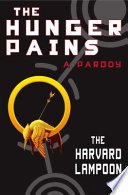The Hunger Pains by The Harvard Lampoon — Book Review
In the world of literature, parody often walks a fine line between tribute and satire—a delicate dance that can either enlighten or alienate its audience. When it comes to parodying a cultural phenomenon as expansive and fervently followed as Suzanne Collins’ “The Hunger Games,” the stakes are high. Enter “The Hunger Pains” by The Harvard Lampoon, a parody that invites readers to view the dystopian world of Panem through a lens of irreverent humor and acerbic wit. But can humor breathe new life into a tale of survival and revolution, or does it risk trivializing the weighty themes at its core? This question sits at the heart of the experience that “The Hunger Pains” offers, making it a fascinating read for those who appreciate the art of satire.
From the very first page, “The Hunger Pains” sets a tone that is distinctly self-aware and unreservedly playful. The book doesn’t shy away from poking fun at the melodramatic elements and the sometimes overly earnest narrative of its source material. The tone is decidedly tongue-in-cheek, with a pacing that mirrors the rapid-fire nature of comedic delivery. The mood oscillates between outright absurdity and cleverly disguised critiques of the dystopian genre itself. This parody is aimed squarely at fans of “The Hunger Games” who possess a healthy sense of humor and an appreciation for the nuances of satire. It’s a book for those who can laugh at their favorite series while still holding it in high regard, much like how one might lovingly tease a cherished friend.
The core of “The Hunger Pains” is its relentless skewering of the tropes and conventions of “The Hunger Games.” It introduces readers to a world that is both familiar and hilariously distorted. The protagonist, Kantkiss Neverclean, is a reflection of Katniss Everdeen, but with a comedic twist that sees her navigating the absurdities of a world where the stakes of life and death are wrapped in layers of farce. The narrative deftly highlights the sometimes illogical or contrived elements of the original series, transforming them into points of humor. In doing so, it raises questions about the nature of storytelling and the expectations audiences bring to dystopian narratives. The arguments here are not just about the story itself but about storytelling as an art form—challenging the reader to consider how genre conventions can both enhance and limit the tales they tell.
In connecting the dots between “The Hunger Pains” and broader themes, it’s impossible to ignore the cultural moment we find ourselves in. As society grapples with issues of inequality, power dynamics, and survival—elements at the heart of “The Hunger Games”—this parody offers a comedic respite that also serves as a mirror to these serious topics. The exaggeration and humor of “The Hunger Pains” can be seen as a way to process and understand these deep-rooted issues, providing a space to reflect on the absurdities of real-world counterparts. In many ways, it echoes the timeless nature of satire as a tool for both critique and catharsis—a reminder that sometimes, laughter is as powerful a form of resistance as any.
On a personal note, “The Hunger Pains” was a refreshing reminder of the power of humor to transform and challenge perceptions. While reading, I was struck by how the parody not only entertained but prompted a reevaluation of my own engagement with popular narratives. It highlighted the importance of approaching beloved stories with both reverence and a willingness to question. The book didn’t just make me laugh; it encouraged a deeper appreciation for the complexity of storytelling and the myriad ways in which it can be interpreted. In a world that often feels heavy with its own narratives, “The Hunger Pains” was a delightful exercise in levity and perspective.
In conclusion, “The Hunger Pains” is more than just a parody; it’s a conversation with its readers about the nature of stories and their impact. It’s a book that will resonate with those who enjoy clever humor and are unafraid to see their favorite tales through a different lens. This is not just a book for fans of “The Hunger Games,” but for anyone who appreciates the art of satire and the ways in which it can illuminate the stories we hold dear. Whether you’re looking for a good laugh or an opportunity to reflect on the narratives that shape our world, “The Hunger Pains” offers a unique and valuable reading experience. So, if you’re ready to see Panem in a whole new light, this is one book you won’t want to miss.

The Hunger Pains
Author: The Harvard Lampoon
Publisher: Simon and Schuster
Published: February 7, 2012
Get the book